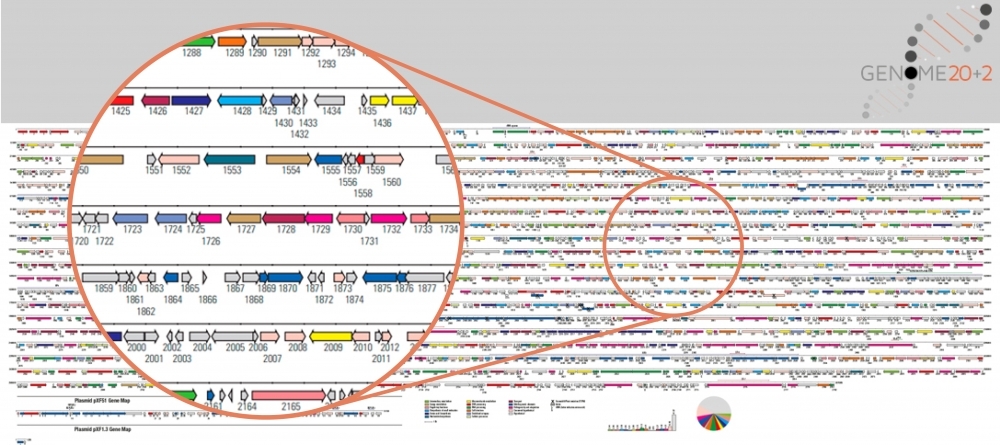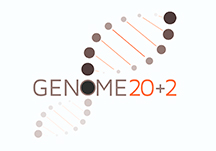

The event will be an opportunity to recall past achievements, discuss the current status of genomics, and forecast future developments in pathogen, cancer and agri-environmental genomics (a detail of the Xylella fastidiosa genome map published on July 13, 2000; credit: Nature/Agência FAPESP)
The event will be an opportunity to recall past achievements, discuss the current status of genomics, and forecast future developments in pathogen, cancer and agri-environmental genomics.
The event will be an opportunity to recall past achievements, discuss the current status of genomics, and forecast future developments in pathogen, cancer and agri-environmental genomics.

The event will be an opportunity to recall past achievements, discuss the current status of genomics, and forecast future developments in pathogen, cancer and agri-environmental genomics (a detail of the Xylella fastidiosa genome map published on July 13, 2000; credit: Nature/Agência FAPESP)
 Agência FAPESP – Twenty-two years ago, the cover of Nature splashed a report on the first whole-genome sequencing of Xylella fastidiosa, the bacterium that causes citrus variegated chlorosis (CVC), known to Brazilian orange growers as amarelinho because it causes yellowing of leaf tissue due to lack of chlorophyll. The disease was then ravaging orange groves in São Paulo state. The project was conducted by a network of 33 laboratories and 191 researchers at several state institutions, integrated virtually by the Organization for Nucleotide Sequencing and Analysis (ONSA). It inaugurated the FAPESP Genome Project and qualified human resources for research on molecular genetics in Brazil.
Agência FAPESP – Twenty-two years ago, the cover of Nature splashed a report on the first whole-genome sequencing of Xylella fastidiosa, the bacterium that causes citrus variegated chlorosis (CVC), known to Brazilian orange growers as amarelinho because it causes yellowing of leaf tissue due to lack of chlorophyll. The disease was then ravaging orange groves in São Paulo state. The project was conducted by a network of 33 laboratories and 191 researchers at several state institutions, integrated virtually by the Organization for Nucleotide Sequencing and Analysis (ONSA). It inaugurated the FAPESP Genome Project and qualified human resources for research on molecular genetics in Brazil.
“FAPESP gave birth to genomics in Brazil,” says Marco Antonio Zago, President of FAPESP. Zago was then head of the Molecular Hematology Laboratory at the University of São Paulo’s Ribeirão Preto Medical School (FMRP-USP), one of the labs in the network that conducted the project.
“The whole-genome sequencing of Xylella fastidiosa was a heroic feat at the time. Its consequences were huge,” he says.
Genome Workshop 20+2 will be held in São Paulo on November 21-22 to celebrate the twenty-second anniversary of the FAPESP Genome Project. The event is part of a series scheduled to commemorate FAPESP’s sixtieth anniversary. In addition to celebrating past achievements, it will be an occasion for discussion of the discipline’s current status and future outlook in three research areas: Genomics of pathogens, Genomics of cancer and Agri-environmental genomics. The complete program is at: 60anos.fapesp.br/genomeworkshop/en.
The site will also feature a series of interviews with the people responsible for the project’s architecture and management, as well as the researchers involved. All are scientists with a long career in their fields but who were then young and doing research for their master’s and doctoral degrees.
In two interviews already posted, José Fernando Perez, Scientific Director of FAPESP at the time the Genome Project was launched, and Fernando Reinach, then a member of FAPESP’s Area Panel for Biology, recall the challenges of organizing, managing and tracking a project that included distributing fragments of X. fastidiosa’s genome to 33 research labs across São Paulo state, and final assembly and annotation of the 2,900 genes at the central bioinformatics lab in Campinas.
“The project cost USD 10 million, although at the time the Brazilian Real was worth 1 dollar. It was the largest science project funded in Brazilian history,” Perez says in his interview, in which Zago also takes part.
“We thought it would be great to have an international committee come here to assess our progress every two or three months since there was a risk that the project wouldn’t be entirely successful. We needed someone to give assurances that it was progressing well, and to offer a solution if it wasn’t,” Reinach says.
Program
The following important scientists will take part in the opening panel, which begins at 9 a.m. on November 21: Zago, President of FAPESP; Scientific Director Luiz Eugênio de Mello; and Reinach, now manager of Pitanga Fund. The FAPESP Genome Project was the brainchild of Reinach and Perez, currently CEO of Recepta Biopharma, a Brazilian biotech company that develops novel cancer drugs.
The first session, on the genomics of pathogens, will be chaired by Marie-Anne Van Sluys, a professor at the University of São Paulo (USP) and a member of the FAPESP’s Adjunct Panel on Special Programs and Research Collaboration. Van Sluys was part of ONSA while she was a graduate student.
“When I remember ONSA, I think of a symphony orchestra in which each player has a score and contributes to the performance. We had a conductor, Andrew Simpson, who guided us with his baton, and there was a group of first violins. But the music only came into its own when everyone was playing,” Van Sluys says.
Besides Perez, the speakers in this first session will include Alessandra Souza, representing the São Paulo’s Agency for Agribusiness Technology (APTA); Jorge Elias Kalil Filho (USP); João Marcelo Pereira Alves (USP); and a representative of the Ag100Pest Initiative, a subgroup of the United States Department of Agriculture’s Arthropod Genomics Research Working Group (to be confirmed).
The afternoon session on agri-environmental genomics will be chaired by Luis Eduardo Aranha Camargo, a professor at USP. The speakers will be Paulo Arruda (State University of Campinas, UNICAMP); Ana Tereza Ribeiro de Vasconcelos (Brazil’s National Scientific Computing Laboratory, LNCC); João Carlos Setubal (USP); Claudia Barros Monteiro-Vitorello (ESALQ-USP); and Mark Blaxter (Program Lead, Tree of Life Program, Wellcome Sanger Institute, UK).
On November 22, the morning session on the genomics of cancer will be chaired by Anamaria Aranha Camargo, a researcher at the Syrian-Lebanese Hospital in São Paulo and a member of FAPESP’s Adjunct Panel on Life Sciences. The speakers will be Andrew Simpson (Orygen Biotecnologia); Emmanuel Dias Neto (AC Camargo Cancer Center); Sergio Verjovsky (Butantan Institute); and Rui Manuel Vieira Reis (Hospital de Amor, formerly Barretos Cancer Hospital). The session will also include a tribute to Professor Ricardo Renzo Brentani, a former Scientific Director of FAPESP who died in 2011, and the Ricardo R. Brentani in Memoriam Lecture delivered by Chi Van Dang, Scientific Director of the Ludwig Institute for Cancer Research (NYC).
“The knowledge acquired in recent decades thanks to cancer genomics research has enabled the development of novel forms of diagnosis and treatment of the disease. Brazil’s contribution has been highly significant, permitting the identification of new genes and defining the gene expression profiles of rare and high-incidence tumors in Brazil,” Camargo said.
Registration for the event is available at: 60anos.fapesp.br/genomeworkshop/en/registration.
Republish
The Agency FAPESP licenses news via Creative Commons (CC-BY-NC-ND) so that they can be republished free of charge and in a simple way by other digital or printed vehicles. Agência FAPESP must be credited as the source of the content being republished and the name of the reporter (if any) must be attributed. Using the HMTL button below allows compliance with these rules, detailed in Digital Republishing Policy FAPESP.





